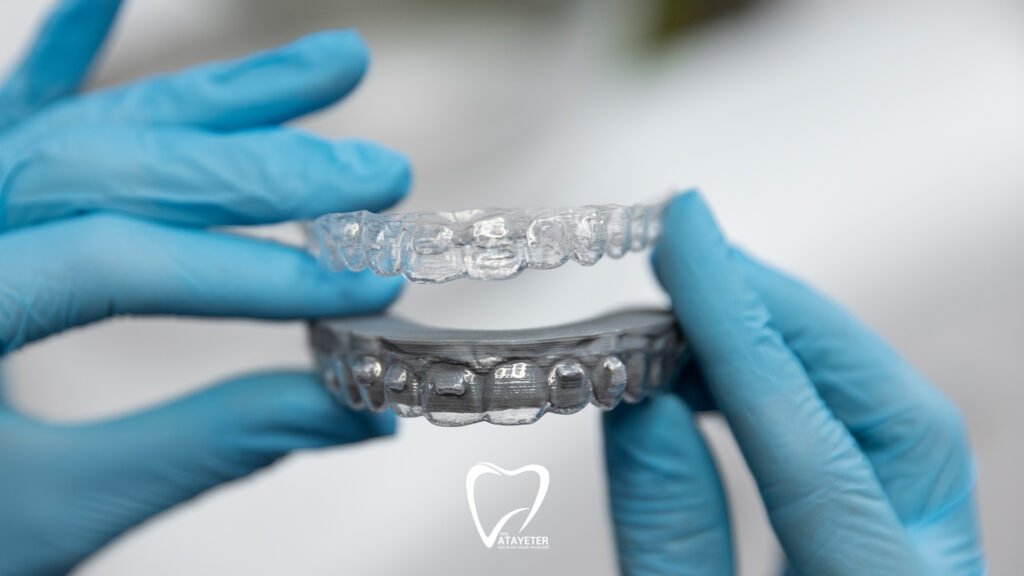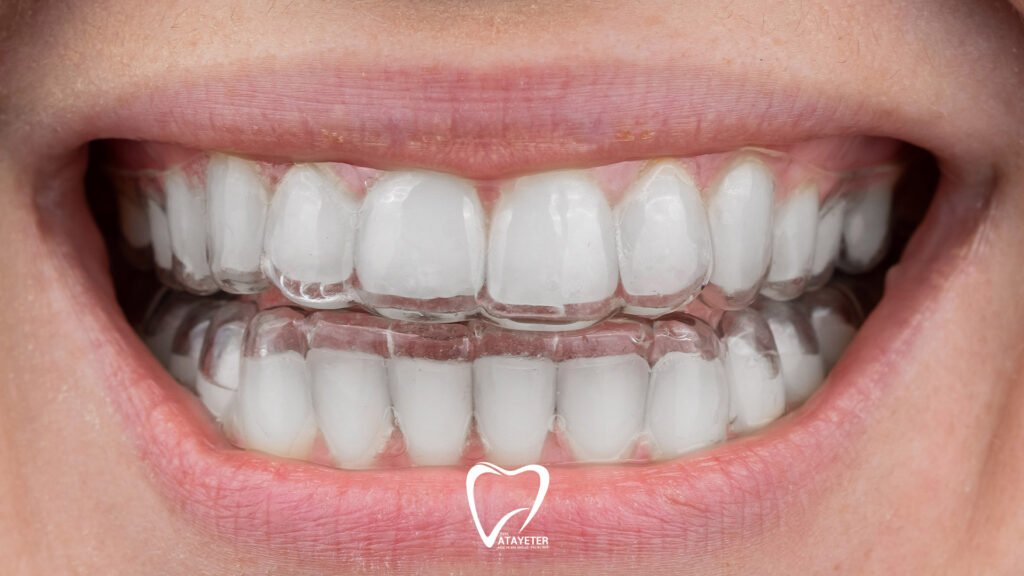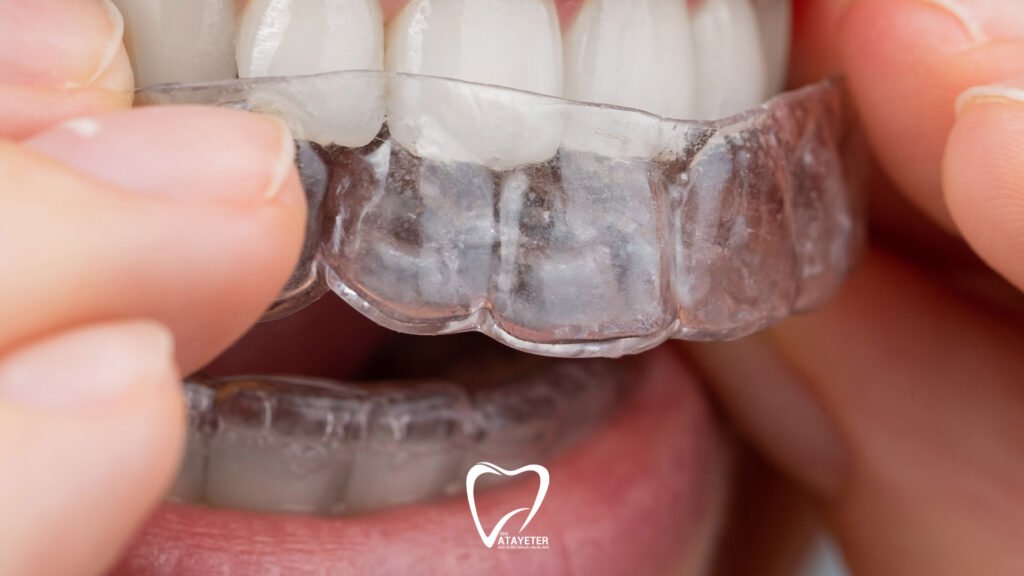What Is a Night Guard?
Have you ever noticed pain in your jaw muscles, a feeling of pressure in your head, or aching in your teeth when you wake up at night? If you answered “yes,” you likely clench or grind your teeth without even realizing it. Daily stress, fatigue, or intense thoughts can plague our bodies, even while we sleep, and this can have the most serious impact on our teeth.
As its name suggests, it’s a mouthguard, usually transparent and custom-made, worn during sleep. While it may seem simple, it’s actually quite effective for protecting teeth, relaxing jaw muscles, and waking up pain-free in the morning. So, with just a small appliance, you can prevent tooth wear and tear and relieve jaw pain throughout the day.
Many people wonder what a nightguard is for, who should use it, and whether it actually works. However, those who try it once often notice an immediate difference when they wake up in the morning. More restful sleep, reduced headaches, and a feeling of comfort on their teeth make nightguards an essential tool for dental health.
What is a Night Guard?
A night guard is a simple yet effective dental guard that we often hear about, but often don’t fully understand its purpose. It’s typically made of clear, hard plastic or acrylic. However, not every night guard is the same, as everyone’s teeth are unique. Therefore, a night guard is custom-made by a dentist, taking impressions of each person’s teeth.

The primary function of a night guard is to prevent direct contact between your teeth throughout the night. This small, transparent device protects your teeth from damage when you unconsciously clench or grind them while sleeping. It’s like invisible armor for your teeth.
This protection protects not only your tooth enamel but also your jaw muscles and jaw joint. Over time, clenching can lead to tension in the jaw muscles, pain in the joints, and even discomfort radiating to the head and neck. A night guard reduces all these negative effects, providing relief for both your teeth and jaw.
Why Do We Clench Our Teeth?
Have you ever thought about why we clench our teeth? Most of the time, we’re not even aware of it. Stress, anxiety, a busy schedule, or suppressed emotions throughout the day they all manifest in our bodies in some way. One of these reactions is unconsciously clenching or grinding our teeth. This condition, medically known as “bruxism,” occurs especially frequently during stressful times.
For some people, this habit continues silently throughout the day; they clench their teeth without realizing it while working at the computer, driving, or lost in thought. However, the real problem usually arises at night. Because while asleep, consciousness is inactive, and the body seeks to release the burden of stress. Teeth grind together, jaw muscles contract, and upon waking in the morning, the person experiences jaw pain, headaches, or aching teeth.
Stress isn’t the only cause of teeth clenching, of course. This behavior can also be triggered by misalignment of teeth, misalignments in jaw structure, or even certain neurological or psychological factors. But the most common cause is the release of tension accumulated throughout the day at night.
What Does a Night Guard Do?
The primary function of a night guard is to protect teeth, but its benefits go far beyond this. By preventing teeth from rubbing together during sleep, it prevents tooth enamel erosion, shortening, and sensitivity. It also relaxes jaw muscles, giving those who have been unconsciously clenching their teeth for a long time a “rest break.” Many people who wake up with jaw pain or headaches notice a significant reduction in these symptoms with regular use of a night guard.
Moreover, it protects not only the muscles but also the jaw joint, preventing joint inflammation and clicking noises that can occur due to excessive pressure. It also helps preserve both your natural dentition and your smile by preventing aesthetic problems such as tooth wear and fracture. In short, this small, clear guard provides great relief for your teeth, jaw, and mornings.

Who Should Use a Night Guard?
While not everyone needs a night guard, for some people, it’s one of the most effective ways to protect their teeth and jaw health. It’s an almost indispensable preventative measure, especially for those with a habit of clenching or grinding their teeth (bruxism). If you wake up with jaw pain, headaches, or a feeling of facial tension, these could be signs that you’ve been clenching your teeth all night.
Furthermore, if you have abrasions on your teeth, cracks in the enamel, or small chips, these are silent signs of teeth grinding. In this case, your dentist may recommend using a night guard to protect your teeth from further wear. Those who have had cosmetic dental implants like zirconium or porcelain are also included in this group, as a night guard helps these special teeth last longer.
Additionally, people who lead stressful lives and unconsciously grind their teeth during the day can also benefit greatly from a night guard. In short, a night guard not only protects your teeth but also your sleep comfort and morning energy. If your dentist suggests this, it’s best not to delay the recommendation.
How to Make a Night Guard
A night guard is not a ready-made product; it’s custom-made because every individual’s teeth are unique. Your dentist first takes an impression of your mouth, which is then used in the laboratory to create a custom-fit tray. Designed to fit perfectly on your teeth, the tray provides both protection and is extremely comfortable to wear.
Once the tray is made, your dentist will try it on and, if necessary, make minor adjustments to ensure a perfect fit. Finally, your night guard is delivered to you, complete with instructions for use and care. In short, the process involves a few simple steps, but ultimately, you’ll have a personal assistant who protects your teeth and ensures a comfortable sleep.

Night Aligner Prices
Night aligner prices can vary due to the customization process. This is because everyone’s teeth, jaw structure, and required type of aligner are unique. The material used, whether the aligner is hard or soft, and the details of the treatment process all impact the price. Therefore, the most accurate and precise information is determined after a dental examination by your dentist. The important thing isn’t just to get a aligner; it’s to find the right solution that will protect your teeth and provide you with personalized comfort. Contact us for detailed information and to find the most suitable night aligner for you.







Comments are closed